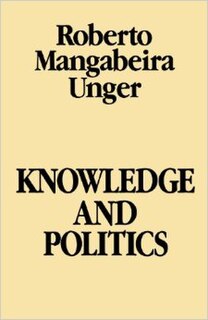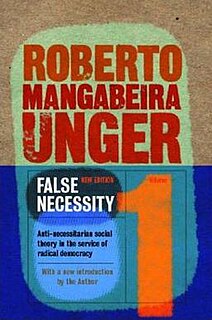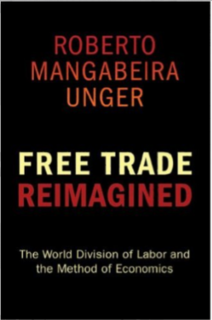Related Research Articles
Negative capability is a phrase first used by Romantic poet John Keats in 1817 to explain the capacity of the greatest writers to pursue a vision of artistic beauty even when it leads them into intellectual confusion and uncertainty, as opposed to a preference for philosophical certainty over artistic beauty. The term has been used by poets and philosophers to describe the ability to perceive and recognise truths beyond the reach of consecutive reasoning.
Critical legal studies (CLS) is a school of critical theory that developed in the United States during the 1970s. CLS adherents claim that laws are devised to maintain the status quo of society and thereby codify its biases against marginalized groups. Despite wide variation in the opinions of critical legal scholars around the world, there is general consensus regarding the key goals of Critical Legal Studies:
Social theories are analytical frameworks, or paradigms, that are used to study and interpret social phenomena. A tool used by social scientists, social theories relate to historical debates over the validity and reliability of different methodologies, the primacy of either structure or agency, as well as the relationship between contingency and necessity. Social theory in an informal nature, or authorship based outside of academic social and political science, may be referred to as "social criticism" or "social commentary", or "cultural criticism" and may be associated both with formal cultural and literary scholarship, as well as other non-academic or journalistic forms of writing.

In the social sciences, social structure is the patterned social arrangements in society that are both emergent from and determinant of the actions of individuals. Likewise, society is believed to be grouped into structurally-related groups or sets of roles, with different functions, meanings, or purposes. Examples of social structure include family, religion, law, economy, and class. It contrasts with "social system", which refers to the parent structure in which these various structures are embedded. Thus, social structures significantly influence larger systems, such as economic systems, legal systems, political systems, cultural systems, etc. Social structure can also be said to be the framework upon which a society is established. It determines the norms and patterns of relations between the various institutions of the society.
In the social sciences there is a standing debate over the primacy of structure or agency in shaping human behaviour. Structure is the recurrent patterned arrangements which influence or limit the choices and opportunities available. Agency is the capacity of individuals to act independently and to make their own free choices. The structure versus agency debate may be understood as an issue of socialization against autonomy in determining whether an individual acts as a free agent or in a manner dictated by social structure.

Roberto Mangabeira Unger is a Brazilian philosopher and politician. His work is in the tradition of classical social theory and pragmatism, and is developed across many fields including legal theory, philosophy and religion, social and political theory, progressive alternatives, and economics. In natural philosophy he is known for The Singular Universe and the Reality of Time. In social theory he is known for Politics: A Work in Constructive Social Theory. In legal theory he was part of the Critical Legal Studies movement, which helped disrupt the methodological consensus in American law schools. His political activity helped the transition to democracy in Brazil in the aftermath of the military regime, and culminated with his appointment as Brazil's Minister of Strategic Affairs in 2007 and again in 2015. His work is seen to offer a vision of humanity and a program to empower individuals and change institutions.

Ellen Meiksins Wood was an American-Canadian Marxist political theorist and historian.
Social corporatism, also called social democratic corporatism, is a form of economic tripartite corporatism based upon a social partnership between the interests of capital and labour, involving collective bargaining between representatives of employers and of labour mediated by the government at the national level. Social corporatism is lesser degree the West European social market economies. It is considered a compromise to regulate the conflict between capital and labour by mandating them to engage in mutual consultations that are mediated by the government.

Passion: An Essay on Personality is a philosophical inquiry into human nature by Brazilian philosopher and politician Roberto Mangabeira Unger. The book explores the individual and his relation to society, asking how one comes to an understanding of self and others. Unger here sees the root human predicament as the need to establish oneself as a unique individual in the world but at the same time to find commonality and solidarity with others. This exploration is grounded in what Unger calls a modernist image of the human being as one who lives in context but is not bound by context.
False necessity, or anti-necessitarian social theory, is a contemporary social theory that argues for the plasticity of social organizations and their potential to be shaped in new ways. The theory rejects the assumption that laws of change govern the history of human societies and limit human freedom. It is a critique of "necessitarian" thought in conventional social theories which hold that parts of the social order are necessary or the result of the natural flow of history. The theory rejects the idea that human societies must be organized in a certain way and that human activity will adhere to certain forms.
Empowered democracy is a form of social-democratic arrangements developed by Brazilian philosopher and politician Roberto Mangabeira Unger, whom first published his theories in 1987. Theorized in response to the repressiveness and rigidity of contemporary liberal democratic society, the theory of empowered democracy envisions a more open and more plastic set of social institutions through which individuals and groups can interact, propose change, and effectively empower themselves to transform social, economic, and political structures. The key strategy is to combine freedom of commerce and governance at the local level with the ability of political parties at the central level to promote radical social experiments that would bring about decisive change in social and political institutions.

Knowledge and Politics is a 1975 book by philosopher and politician Roberto Mangabeira Unger. In it, Unger criticizes classical liberal doctrine, which originated with European social theorists in the mid-17th century and continues to exercise a tight grip over contemporary thought, as an untenable system of ideas, resulting in contradictions in solving the problems that liberal doctrine itself identifies as fundamental to human experience. Liberal doctrine, according to Unger, is an ideological prison-house that condemns people living under its spell to lives of resignation and disintegration. In its place, Unger proposes an alternative to liberal doctrine that he calls the "theory of organic groups," elements of which he finds emergent in partial form in the welfare-corporate state and the socialist state. The theory of organic groups, Unger contends, offers a way to overcome the divisions in human experience that make liberalism fatally flawed. The theory of organic groups shows how to revise society so that all people can live in a way that is more hospitable to the flourishing of human nature as it is developing in history, particularly in allowing people to integrate their private and social natures, achieving a wholeness in life that has previously been limited to the experience of a small elite of geniuses and visionaries.

The Critical Legal Studies Movement is a book by the philosopher and politician Roberto Mangabeira Unger. First published in 1983 as an article in the Harvard Law Review, published in book form in 1986, and reissued with a new introduction in 2015, The Critical Legal Studies Movement is a principal document of the American critical legal studies movement that supplied the book with its title. In the book, Unger argues that law and legal thought offers unrealized possibilities for the self-construction of a more democratic society, and that many lawyers and legal theorists have uncritically surrendered to constraints that undermine their ability to make use of law's transformative potential. Unger explains how the critical legal studies movement has refined and reformulated the major themes of leftist and progressive legal theorists, namely the critique of formalism and objectivism in legal doctrine, and the purely instrumental use of legal practice and doctrine to advance leftist aims, and in doing so, has identified elements of a constructive program for the reconstruction of society.

What Should Legal Analysis Become? is a book by philosopher and politician Roberto Mangabeira Unger. First published in 1996, the book germinated from lectures Unger gave at Yale Law School, Columbia Law School, and the London School of Economics. In the book, Unger argues that in order to transform society to be more radically democratic, it is necessary to penetrate the specialized professions so that we can talk about, and imagine, institutions effectively. Unger focuses on the legal profession in this book, setting forth a vision of law as "institutional imagination." He presents a program for changing the nature of the legal profession so that less power is vested in legal professionals and institutions, and legal analysis is reoriented to be more egalitarian and advance more effectively the democratic project.

The Religion of the Future is a book by the philosopher and politician Roberto Mangabeira Unger. In the book, he argues that humanity is in need of a religious revolution that dispenses with the concept of God and elements of the supernatural, a revolution that expands individual and collective human empowerment by fostering a condition he calls "deep freedom"—a life of creativity, risk, experiment, and meaningful personal connection—protected by structure-revising social and political structures of an empowered democracy hospitable to the context-breaking capacities inherent in human life.

Democracy Realized: The Progressive Alternative is a 1998 book by philosopher and politician Roberto Mangabeira Unger. In the book, Unger sets forth a program of "democratic experimentalism" that challenges and defies the neoliberal consensus that there are few alternatives for the progressive reform of democratic and market structures.

The Self Awakened: Pragmatism Unbound is a 2007 book by philosopher and politician Roberto Mangabeira Unger. In the book, Unger sets forth a theory of human nature, a philosophical view of time, nature and reality, and a proposal for changes to social and political institutions so that they best nourish the context-transcending quality that Unger sees at the core of human existence. Written in a prophetic and poetic manner that drew comparison with the work of Whitman and Emerson, and delving into issues of humankind's existential predicament in a manner that one critic found evocative of Sartre, The Self Awakened also serves as a summation of many of the core principles of Unger's work.

Politics: A Work in Constructive Social Theory is a 1987 book by Brazilian philosopher and politician Roberto Mangabeira Unger. In the book, Unger sets out a theory of society as artifact, attempting to complete what he describes as an unfinished revolution, begun by classic social theories such as Marxism, against the naturalistic premise in the understanding of human life and society. Politics was published in three volumes: False Necessity: Anti-Necessitarian Social Theory in the Service of Radical Democracy, the longest volume, is an explanatory and programmatic argument of how society might be transformed to be more in keeping with the context-smashing potential of the human imagination; Social Theory: Its Situation and Its Task, is a "critical introduction" that delves into issues of social science underpinning Unger's project; and Plasticity Into Power: Comparative-Historical Studies on the Institutional Conditions of Economic and Military Success, is a collection of three historical essays illuminating the theoretical points Unger advanced in the first two volumes. In 1997, an abridged, one-volume edition of Politics was issued as Politics, The Central Texts, edited by Zhiyuan Cui.

The Left Alternative is a 2009 book by philosopher and politician Roberto Mangabeira Unger. In the book, Unger identifies problems with contemporary leftism and proposes a way to achieve the goals that he believes should be central to the progressive cause: inclusive economic growth through the heating up of politics and democratizing the market economy, a relentless process of institutional innovation that depends less upon crisis for change, and depends more on shortening the distance between context-preserving and context-transforming moves. The Left Alternative was first published in 2006 as What Should the Left Propose?

Free Trade Reimagined: The World Division of Labor and the Method of Economics is a 2007 book by philosopher and politician Roberto Mangabeira Unger. In the book, Unger criticizes the doctrine holding that maximization of free trade should be the commanding goal of the worldwide trading regime, contending that this doctrine is misguided. Instead, Unger argues, the goal of an open worldwide trading regime should be reconciled with measures that foster national and regional diversity, deviation, heresy, and experiment in production, markets and economies. Unger further explores how the tradition of marginalism has rendered the discipline of economics incapable of offering deep insight into the problems of trade and of the global division of labor.
References
- ↑ Trubek, David M. 1990. "Programmatic Thought and the Critique of the Social Disciplines." In Critique and Construction, ed. M Perry. Cambridge: Cambridge University Press, p. 233.
- ↑ Unger, Roberto Mangabeira (2001). False Necessity. New York: Verso. pp. 58–59, 69–82.
- ↑ Unger, Roberto Mangabeira (2001). False Necessity. New York: Verso.
- ↑ For good overviews of Unger's thought see Collins, Hugh. “Roberto Unger and the Critical Legal Studies Movement,” Journal of Law and Society 14 (1987), Trubek, David M. "Radical Theory and Programmatic Thought." American Journal of Sociology 95, no. 2 (1989).
- ↑ Unger, Roberto (1987). Social Theory, Its Situation and Its Task . Cambridge: Cambridge University Press. p. 63. ISBN 978-0-521-32974-3.
- ↑ Unger, Roberto (2004). False Necessity: Anti-Necessitarian Social Theory in the Service of Radical Democracy, Revised Edition. London: Verso. pp. 61–66. ISBN 978-1-85984-331-4.
- ↑ Unger, Roberto (2004). False Necessity: Anti-Necessitarian Social Theory in the Service of Radical Democracy, Revised Edition. London: Verso. pp. 69–82. ISBN 978-1-85984-331-4.